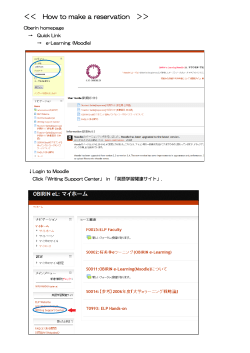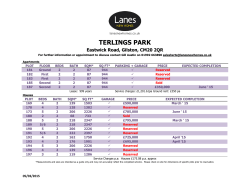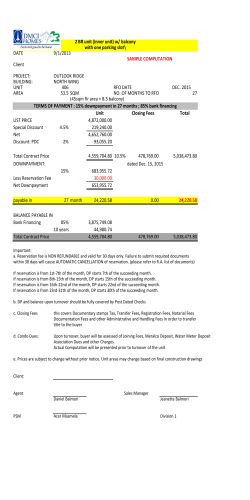
The Internet Era Implications over the Romanian Travel Agencies
International Journal of Academic Research in Business and Social Sciences March 2015, Vol. 5, No. 3 ISSN: 2222-6990 The Internet Era Implications over the Romanian Travel Agencies Laura-Cristina Maniu, Lecturer Ph.D. Romanian-American University School of Domestic and International Economy of Tourism, Romania E-mail: [email protected] Andreea Marin-Pantelescu, Lecturer Ph.D. Bucharest University of Economic Studies Faculty of Business and Tourism, Romania E-mail: [email protected] DOI: 10.6007/IJARBSS/v5-i3/1505 URL: http://dx.doi.org/10.6007/IJARBSS/v5-i3/1505 Abstract: Most people, young and seniors, are these days’ familiars with using the Internet and searching online for information on the Google, Facebook, Yahoo, Twitter, and so on. So the clients have now the opportunity to book on-line, by-passing the traditional high street distribution channel. See for example the Booking.com portal, hosting more than 607,000 accommodation possibilities over the world. Each day, over 800,000 room nights are reserved on Booking.com. On the other hand, the travel agencies reservation systems has evolved and transformed into high technology performance by booking and selling in an instant tourist packages. The present paper highlights the internet era implications over the Romanian travel agencies presenting a comparative analysis between their reservation systems used in order to satisfy the customers’ needs and wants. Key-words: Travel agency, internet, holiday, customer, reservation 1. Introduction There are always changes in IT technology. There is no secret of that! For example, according to IATA (International Air Transport Association) “on 1 June 2008, the airline industry moved to 100% electronic ticketing and the paper ticket became a thing of the past. Apart from substantial cost savings for the industry of up to US$3bilion per year, ET is also more convenient for passengers who no longer have to worry about losing tickets and can make changes to itineraries more easily”. Web-enabled wireless devices will increase in number and capacity, allowing a marketing supervisor to keep in touch with agents in no time. For a tour-operator, high-speed access to 119 www.hrmars.com International Journal of Academic Research in Business and Social Sciences March 2015, Vol. 5, No. 3 ISSN: 2222-6990 the Internet is crucial and for that a properly equipped business centre can offer the very latest technology with such access (Wearne and Baker, 2002). “It was the late 1990s that the dot.com mania reached its height as investors poured millions of pounds into one on-line travel agency after another” (Syratt, 2003). Some of the online investors built strong brands as Expedia, e-bookers, Travelocity, Lastminute.com, Online Travel Corporation and Web Weekends. Logging on to these websites you can find and book hotels, flights, car rental, travel insurance, meals and other travel components and services. Most people, young and seniors, are these days familiars with using the Internet and searching online for information on the Google, Facebook, Yahoo, Twitter, and so on. So the clients have now the opportunity to book on-line, by-passing the traditional high street distribution channel. See for example the Booking.com portal, hosting more than 607,000 accommodation possibilities over the world. Each day, over 800,000 room nights are reserved on Booking.com. On the other hand, the travel agencies reservation systems has evolved and transformed into high technology performance by booking and selling in an instant tourist packages. The present paper highlights the internet era implications over the Romanian travel agencies presenting a comparative analysis between their reservation systems used in order to satisfy the customers’ needs and wants. 2. The present stage of knowledge Like travel agents, tour-operators have been looking at how the Internet will affect their businesses (Syratt, 2003). Lot of bibliography about the internet implication over the tourism industry was created and names as Pender (1999), Porter (2001), Holloway (2002), Buhalis (2003), are always brink into discussion particularly on this subject. The Internet affects both tour-operators and travel agencies retailers, but while travel agencies retailers have viewed net as a threat to their businesses, tour operators see in it an possibility to expand and diversify their distribution channels putting their tourist packages in front of more potential clients, while also cutting their expenses. “Evidence so far suggests that customers like to go on-line to research their holidays, and even to make simple booking, maybe a flight from London to Paris or New York” (Syratt, 2003). “Travel agents can use the internet as an additional means of information retrieval to help them in their advisory role. The internet is suitable for use by many of the smaller travel and tourism operators who may not be able to afford large publicity campaigns and costly distribution systems” (Pender, 1999). According to Porter (2001) “the internet greatest impact has been to enable the reconfiguration of existing industries that had been constrained by high costs for communicating, gathering information, or accomplishing transactions”. Also Porter (2001) indicates that “the internet is the most powerful tool available today for enhancing operational effectiveness. By easing and speeding the exchange of real-time information, it enables improvements throughout the entire value chain, across almost every company and industry”. 120 www.hrmars.com International Journal of Academic Research in Business and Social Sciences March 2015, Vol. 5, No. 3 ISSN: 2222-6990 Measuring the Internet is hard but The Internet Society provided some important data to underpin discussion and speculation about how the Internet is changing (see table 1). Table 1. Measuring the Internet evolution In 2007, 1000s of the networks contributed In 2007, over 10 ports contribute 50% of all 50% of all observed Internet traffic. observed Internet traffic. In 2009, 150s networks contributed 50% of In 2009, 1 port contributes 50% of all all observed Internet traffic. observed Internet traffic. Source: http://www.internetsociety.org/internet/how-internet-evolving/internet-evolution/data#overlay-context In order to put a package tour programme into operation, a reservations system must be developed and implemented via internet. Initially, the CRS operated only “in-house” within the operator’s but in the recent years a lot of economic innovation was taking place in the commercial agreements between operators. “The computer will allow the travel agent to see whether the particular tour required is available, or if it is not, will automatically display the dates or destinations nearest to the client’s needs and wants. And once the travel agent has established that the package is acceptable to the client, a booking is made” (Holloway, 2002). 3. Comparative analysis between Romanians’ travel agencies reservation systems The Romanians’ travel agencies are up to date with the IT technologies investing more and more in operational reservation systems. On one hand we have the tour-operators with their own reservation systems and on the other hand we have the Romanians’ travel agencies retailers using both national and international reservation systems. Logging in with username and password a travel agency retailer can find out the availability to an accommodation required by a customer in a touroperation system. First we will examine the B2B Christian Tour reservation system. Figure no.1 shows us the image of the reservation system before looking for a tourist package and introducing the data to find out more about a tour package. A travel agency retailer, Magellan Travel is logging into the B2B Christian Tour reservation system using their own certificated username and password looking for a package tour to London-Benelux, one double room for two adults. After introducing the keywords the system generates the research findings as we can see in figure no.2 (The B2B Christian Tour reservation system after). Now we can see the price for the London-Benelux tour package and also the green light indicates the availability on this tour so if our tourists want to go we can make the booking for them in real time. This system has friendly menu, which greatly help travel agencies retailers suggesting destinations that tour operator has for sale in a specific period of time. 121 www.hrmars.com International Journal of Academic Research in Business and Social Sciences March 2015, Vol. 5, No. 3 ISSN: 2222-6990 Source: Courtesy of Magellan Travel Figure 1. The B2B Christian Tour reservation system before Source: Courtesy of Magellan Travel Figure 2. The B2B Christian Tour reservation system after 122 www.hrmars.com International Journal of Academic Research in Business and Social Sciences March 2015, Vol. 5, No. 3 ISSN: 2222-6990 Second we will examine the B2B Cocktail Holidays reservation system. Now we are looking for a holiday package to Santorini, Greece. In this system the city from the menu refers to the Greek islands. All fields with * must be filled otherwise the system cannot generate search results for your destination. Figure no.3 indicates The B2B Cocktail Holidays reservation system before when we want to find out more about the holiday package to Santorini, Greece. Source: Courtesy of Magellan Travel Figure 3. The B2B Cocktail Holidays reservation system before After introducing the data the system generates Figure no.4 The B2B Cocktail Holidays reservation system after. Now we can see the holiday package in ascending order of the price, the early booking prices for this holiday package and the availability of the seats. The B2B Cocktail Holidays reservation system is detailed, easy to use and practical and if we want to print the holiday offer for the customer we just have to click the offer info icon from the menu. Regarding the room type the icon beside indicates all the room types available at that particular hotel that we search for, and the same concept applies to the meals types. 123 www.hrmars.com International Journal of Academic Research in Business and Social Sciences March 2015, Vol. 5, No. 3 ISSN: 2222-6990 Source: Courtesy of Magellan Travel Figure 4. The B2B Cocktail Holidays reservation system after Third we move on in our research to smaller travel agencies that have created and developed their own reservation systems. Deserve to be mentioned the RezEx travel agency reservation system and Fresh Holidays travel agency reservation system. The RezEx travel agency reservation system provides hotel reservations, flights reservations, transfers from the airport to the hotel (for the arrivals) and from the hotel to the airport (for the departures), rental cars, and booking holidays in Romania. With a database of over 10,000 hotels operated by online reservation system, the outgoing tourism department of the RezEx travel agency will organize trips and tours worldwide, ensuring all necessary travel documents. Rezex uses advanced systems for booking flights tickets. Ticketing specialists of the travel agency can make reservations and issue tickets to any destination, nationally and internationally, working with all airlines that operate in Romania, offering optimal solutions for route and rates preferred by the customers. 124 www.hrmars.com International Journal of Academic Research in Business and Social Sciences March 2015, Vol. 5, No. 3 ISSN: 2222-6990 Source: Courtesy of RezEx Figure 5. The RezEx travel agency reservation system The Fresh Holidays travel agency reservation system named Travelio is very effective and detailed, offering personalized tourism services. The main strengths of the system are real-time reservation and personalized services for the clients, and also it is easy to use by travel agencies retailers. The Travelio weaknesses resided in the fact that occasionally it blocks. If this happens during a reservation proceeding you have to start all over again. Like a solution, it is required an intermediary save possibility in the Travelio reservation system. The implications of the internet over the Romanian travel agency are putting travel agencies in direct relation to the clients’ wants and needs. The reservation systems will allow the agent to see whether or not the particular tour required by the customer is available. Once the agent has established that a package wants to be bought by the client, a booking is made (sometimes an option can be taken for 24 hours, and the system shows the icon RQ – reservation on request, but operators now tending to accept only firm bookings). 125 www.hrmars.com International Journal of Academic Research in Business and Social Sciences March 2015, Vol. 5, No. 3 ISSN: 2222-6990 Source: Courtesy of Fresh Holidays Figure 6. Travelio – The Fresh Holidays travel agency reservation system The green areas signify that the money for the tourist package are received and collected by the travel agency and the white areas signify that the tourists had to make the payment for the tourist packages. The system offers the possibility to generate the invoice and the voucher for the purchased services. The advent of e-tickets and vouchers help to reduce the amount of paperwork sent by the travel agencies to their clients. The internet helps travel agencies in relation with the customers. So they can monitor and handle more easier the customers’ complaints and administer quality control measures in the operation of the tour programme. The key question is not whether such new techniques will start to replace traditional methods of booking holidays, but rather how fast the change and the transition will occur and how will dominate the traditional distributions channels. From the staff of the travel agencies, computer and information skills are required in order to make a statement in the on-line market place. In the online field staff must own passengers problems and must be actively involved and committed to the IT programme. Using the reservation systems a travel agency can be much closer with their customers, and this helps and makes their business more prosperous. Nevertheless the most important thing is that the credibility comes from the tour operator and from the travel agency; do not come from the reservation system that is a precious tool for the future of tourism activity. 126 www.hrmars.com International Journal of Academic Research in Business and Social Sciences March 2015, Vol. 5, No. 3 ISSN: 2222-6990 Tez Tour tour operator has the Tez Tour reservation system used by the Romanian’s travel agencies. The Tez Tour reservation system is one of the best form their point of view. The Tez Tour reservation system high-performance allows different search of tourism services for tourist destinations like Turkey, Greece and Egypt. It is complex and gives you flexibility in terms of searching criteria. Source: Courtesy of Fresh Holidays Figure 7. TEZ TOUR reservation system The detailed and personalized menu of the reservations systems can provide a tailored holiday product to the clients, drawing on travel elements from a range of suppliers. Also, the specialist niche products are likely to become popular on the internet and this gives smaller tour operators an opportunity for their business. 4. Conclusions The present paper presented the implication of the internet over the Romanian travel agencies by making an analysis of the most important reservation systems used in order to satisfy the customers’ needs and wants. We analysed The B2B Christian Tour reservation system, The B2B Cocktail Holidays reservation system, The RezEx travel agency reservation system, Travelio – The Fresh Holidays travel agency reservation system and TEZ TOUR reservation system. All of them are easy to use, detailed in services provided, reliable and well-founded. The reservation systems offer the possibility to keep in touch with the potential and effective clients and to anticipate their preferences, need and want. 127 www.hrmars.com International Journal of Academic Research in Business and Social Sciences March 2015, Vol. 5, No. 3 ISSN: 2222-6990 Also, the staff (the travel agents) needs to be qualified to work in the on-line space and to be prepared and informed in training programmes about the reservation system facilities and performance. Bibliography 1. Buhalis, D. (2003). eTourism: Information technology for strategic tourism management. London: Pearson (Financial Times/Prentice Hall) 2. Holloway J. Christopher (2009), The business of tourism, eighth edition, Prentice Hall, London 3. Holloway J. Christopher (2002), The business of tourism, sixth edition, Prentice Hall, London 4. Law Rob (2010). Progress in tourism management: A review of website evaluation in tourism research. Tourism Management (31), 297–313 available at http://www.irproje.com/ media/userfiles/610084.pdf 5. Pender Lesley (1999), Marketing Management for Travel and Tourism, Stanley Thornes Publishers Ltd. 6. Porter E. Michael (2001), Strategy and the Internet. Harvard Business Review, 3 (79), 63–78 available at https://hbr.org/2001/03/strategy-and-the-internet/ar/1 7. Syratt Gwenda (2003), Manual of travel agency practice, Third edition, Elsevier Butterworth-Heinemann, Oxford 8. Wearne Neil, Baker Kevin (2002), Hospitality Marketing in the e-Commerce age, Hospitality Press, Australia 9. IATA, Simplifying the Business - E-ticketing available at http://www.iata.org/whatwedo/ stb/Pages/e-ticketing.aspx 10. The Internet Society, The data of Internet Evolution available at http://www.internetsociety.org/internet/how-internet-evolving/internetevolution/data#overlay-context 128 www.hrmars.com
© Copyright 2026









